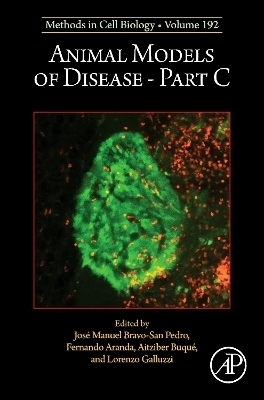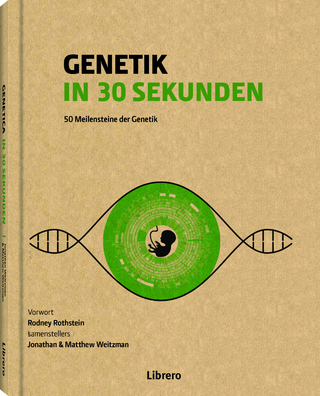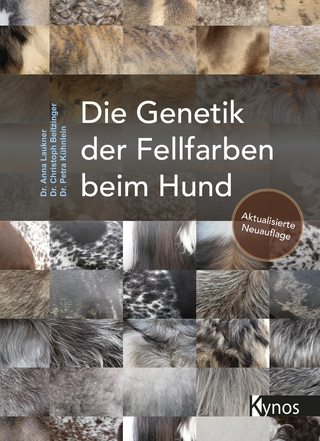
Animal Models of Disease Part C
Academic Press Inc (Verlag)
978-0-443-22242-9 (ISBN)
- Noch nicht erschienen (ca. Februar 2025)
- Versandkostenfrei innerhalb Deutschlands
- Auch auf Rechnung
- Verfügbarkeit in der Filiale vor Ort prüfen
- Artikel merken
Additional sections cover Antimicrobial regime for gut microbiota depletion in experimental mice models, Evaluating polyglutamine protein aggregation and toxicity in transgenic Caenorhabditis elegans models of Huntington's disease, A model of intraperitoneal ovarian cancer to study tumor responses to radioimmunotherapy, Metallic nanoparticles biodistribution for the study of lymphoma in animal models, Stereotactic injection of murine brain tumor cells for neuro-oncology studies, Evaluating amyloid-beta aggregation and toxicity in transgenic Caenorhabditis elegans models of Alzheimer's disease, and much more.
Lorenzo Galluzzi is Assistant Professor of Cell Biology in Radiation Oncology at the Department of Radiation Oncology of the Weill Cornell Medical College, Honorary Assistant Professor Adjunct with the Department of Dermatology of the Yale School of Medicine, Honorary Associate Professor with the Faculty of Medicine of the University of Paris, and Faculty Member with the Graduate School of Biomedical Sciences and Biotechnology of the University of Ferrara, the Graduate School of Pharmacological Sciences of the University of Padova, and the Graduate School of Network Oncology and Precision Medicine of the University of Rome “La Sapienza. Moreover, he is Associate Director of the European Academy for Tumor Immunology and Founding Member of the European Research Institute for Integrated Cellular Pathology. Galluzzi is best known for major experimental and conceptual contributions to the fields of cell death, autophagy, tumor metabolism and tumor immunology. He has published over 450 articles in international peer-reviewed journals and is the Editor-in-Chief of four journals: OncoImmunology (which he co-founded in 2011), International Review of Cell and Molecular Biology, Methods in Cell biology, and Molecular and Cellular Oncology (which he co-founded in 2013). Additionally, he serves as Founding Editor for Microbial Cell and Cell Stress, and Associate Editor for Cell Death and Disease, Pharmacological Research and iScience. Fernando Aranda holds a BSc in Biology (2006) and Biochemistry (2007) from the University of Navarra. Then, he specialized in different strategies of Cancer Immunotherapy with a MSc in Biomedical Research (2008), and a PhD Degree (2012) from the University of Navarra (Pamplona) – Cima University of Navarra. More than 12 years in translational research focus on antitumor immune responses and Cancer Immunotherapy. Author of 64 publications indexed in PubMed in prestigious international journals, with h-index 30 and 4,296 cites (October 2022). He completed the Program of Sara Borrell (ISCIII) -competitive Postdoctoral contract- in the Group of Immune Receptors of the Innate and Adaptive System (IDIBAPS), Barcelona (2016-2018). Co-author of 1 invention patent: Composition based on the fibronectin domain A for the treatment of melanoma - WO/2011/101332. In 2012, Fernando Aranda obtained a Scientific Award, "Profesor Durantez" II Edición, for the best scientific article in Tumor Immunology by Fundación LAIR. Recently, Fernando Aranda awarded a competitive Research Fellow contract “Miguel Servet tipo I by Instituto de Salud Carlos III, to continue his independent researcher career (IP) in cancer immunotherapy issues. Specifically, he is involved in Translational Immunotherapy of Peritoneal Carcinomatosis. Currently, Fernando Aranda leads a research group in cooperation with Dr. Pedro Berraondo. Aitziber Buqué is currently a Post-Doctoral Associate with the Galluzzi Lab, in the Department of Radiation Oncology at Weill Cornell Medical College (New York), where she investigates innate and acquired mechanisms of resistance to immunotherapy in HR+ breast cancer and radiotherapy as a means to overcome them. Prior to joining the Galluzzi Lab (2018), Aitziber was a Post-Doctoral Associate with the Kroemer Lab in the Cordeliers Research Center (Paris, France; 2014-2018), after receiving her M.Sc. in Bioinformatics and Computational Biology (2006) from the Complutense University (Madrid, Spain) and her Ph.D. in Biomedicine (2013) from the BioCruces Research Institute (Barakaldo, Spain). Aitziber has a long-standing interest in the immunological mechanisms controlling cancer progression and response to treatment. Jose Manuel Bravo-San Pedro is currently a researcher at the Department of Physiology of the Complutense University of Madrid thanks to a Ramon y Cajal contract grant. He got his Ph.D. in biochemistry, cellular biology and genetics from the University of Extremadura (Caceres, Spain) in 2011, and he did a post-doctoral stage in the laboratory of Prof. Guido Kroemer. His main research interests have always been linked to autophagy, addressing this cellular process associated with neurodegenerative diseases or cancer and recently obesity and specifically related to problems in the correct functioning of the cilium. He is co-inventor of two patents and co-author of 110 publications indexed in PubMed in prestigious international journals, with h-index 45 and 23768 cites (Dec 2022).
Preface
Lorenzo Galluzzi, Fernando Aranda, Aitziber Buque and José Manuel Bravo-San Pedro
1. Characterizing tumour-infiltrating group 1 innate lymphoid cells in PyMT breast tumours
Nicolas Jacquelot, Sara Lamorte, Alisha Elford, Douglas Chung, Kiichi Murakami and Tracy McGaha
2. The current models unravel the molecular mechanisms underlying the intricate pathophysiology of Alzheimer’s disease using Zebrafish.
Ginpreet Kaur and Baban Thawkar
3. Colitis mouse model
Daniel Ajona, Yaiza Senent, Ana Remírez and Beatriz Tavira
4. Matching model with mechanism: appropriate animal models for studying various aspects of diabetes pathophysiology
Aileen King and Lydia Faith Daniels Gatward
5. Induction of sepsis in a rat model by the cecal ligation and puncture technique. Application for the study of experimental acute renal failure
Alberto Lazaro Fernandez Sr. and María Ángeles González-Nicolás
6. Human cancer cells xenografts to assess the efficacy of granulysin-based therapeutics
Alberto Anel Bernal
7. Antimicrobial regime for gut microbiota depletion in experimental mice models
Francisco Lozano, Laura Carrillo-Serradell, Alessandra Borgognone, Marc Noguera-Julian, Violeta Planells-Romeo, Lucía Aragón-Serrano, Mariona Parera, Sergi Casadó-Llombart, María Velasco-de Andrés and Roger Paredes
8. Evaluating polyglutamine protein aggregation and toxicity in transgenic Caenorhabditis elegans models of Huntington's disease
Leticia Priscilla Arantes and Felix Alexandre Antunes Soares
9. A model of intraperitoneal ovarian cancer to study tumor responses to radioimmunotherapy
Julie Constanzo, Jean-Pierre POUGET, Clara Diaz Garcia-Prada and Salima Atis
10. Metallic nanoparticles biodistribution for the study of lymphoma in animal models
Laura Mondragón Martínez, Barbara Chalhoub and Víctor F. Puntes
11. Stereotactic injection of murine brain tumor cells for neuro-oncology studies
Mara De Martino, Claire I. Vanpouille-Box, Camille Daviaud and María Cecilia Lira
12. Evaluating amyloid-beta aggregation and toxicity in transgenic Caenorhabditis elegans models of Alzheimer's disease
Leticia Priscilla Arantes, Felix Alexandre Antunes Soares and Larissa Marafiga Cordeiro
| Erscheint lt. Verlag | 1.2.2025 |
|---|---|
| Reihe/Serie | Methods in Cell Biology |
| Verlagsort | San Diego |
| Sprache | englisch |
| Maße | 152 x 229 mm |
| Themenwelt | Naturwissenschaften ► Biologie ► Genetik / Molekularbiologie |
| Naturwissenschaften ► Biologie ► Zellbiologie | |
| ISBN-10 | 0-443-22242-8 / 0443222428 |
| ISBN-13 | 978-0-443-22242-9 / 9780443222429 |
| Zustand | Neuware |
| Informationen gemäß Produktsicherheitsverordnung (GPSR) | |
| Haben Sie eine Frage zum Produkt? |
aus dem Bereich


